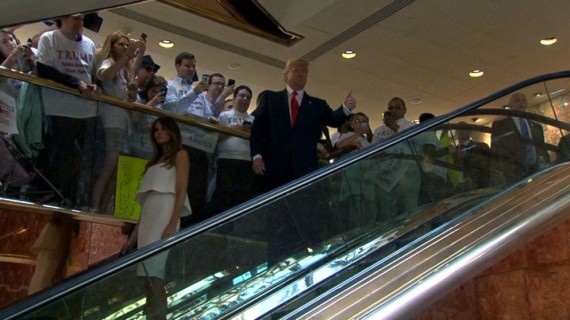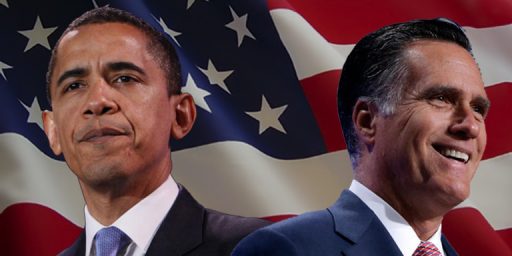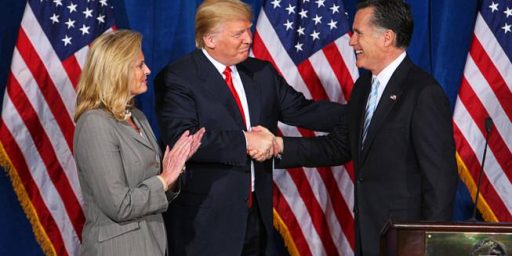Donald Trump’s Substance Free Campaign For President
Donald's Trump's campaign is the logical conclusion of more than a decade of emotion-drive, substance-free politics.
Over at Reason, Peter Suderman makes this observation about Donald Trump’s campaign and the people who support him:
What Trump offers is a fantasy of governance without negotiation, of economic success without policy detail, of a president who does not particularly feel the need to act presidential. It’s a fantasy of politics without politics, for people who just don’t want to think about it too much. In this view, the fact that Trump has clearly put so little thought into it himself makes him seem sensible and relatable. All of which is to say that the mindlessness and stupidity of Trump’s presidential campaign are not incidental to the candidate’s recent success. On the contrary, they are key to his appeal.
All of this is, in some sense, an outgrowth of the Republican party’s own mindlessless during the Obama era. The party has consistently refused to be clear about its domestic policy goals, and what it plausibly expects from government. And while it has not, as a general rule, fully embraced Trump levels of of vapidity, it has embraced figures like Trump, and allowed them to rise within the party.
This was clearly evident, albeit in a much milder form, in Mitt Romney’s 2012 run as the GOP nominee, which was marked by its consistent lack of policy detail, and by Romney’s unwillingness to provide clarity about his policy plans. Romney did, however, praise Trump’s “extraordinary ability to understand how our economy works and to create jobs” as he accepted Trump’s endorsement.
It’s evident still, in the party’s ongoing inability to unify around an Obamacare replacement, to reckon with the realities of immigration, to discuss in detail what cutting the federal budget would really entail. It is telling, I think, that a top priority for one of the major intellectual movements on the right is simply to encourage Republicans to engage with policy ideas, at all.
Trump’s candidacy is what a refusal to engage with policy and its practical realities looks like when taken to an extreme. He is a mindless candidate for a party that for years has casually courted mindlessness, and is now faced with the worrying possibility that it might prevail.
Suderman bases much of his column off of a piece by Andy Kroll that appears in this weeks print edition of National Journal in which Kroll attempts to treat the Trump campaign seriously just as a political reporter would treat any other candidate for President, especially one that was running at the front of the pack after only a month and a half in the race. To that end, Kroll followed Trump on his trip to Laredo, Texas last month, attempted to contact his campaign regarding answers to basic policy questions, and spoke with Trump supporters at campaign appearances in an effort to figure out exactly why it was that they were supporting this guy for President. The entire piece is worth a reason, but as you imagine Kroll’s efforts were largely unsuccessful. Trump didn’t answer any substantive questions during his campaign visit to Laredo, his campaign never got back to Kroll with answers to any of his policy questions, and the responses from Trump supporters regarding why they were supporting him were as astoundingly mindless as the ones that a Bloomberg Politics focus group in New Hampshire gave last week.
None of this should come as a surprise, of course. As I noted last month just as the Trump bandwagon was picking up steam, it is eminently clear that neither Trump nor his supporters care one whit about policy matters or about answering the practical question of how Trump is going to “Make America Great Again,” to borrow a campaign slogan that Donald Trump basically stole without attribution from Ronald Reagan’s 1980 campaign for President. Trump’s campaign is not about policy, though, it is about exploiting the infotainment industry that Cable and Internet “news” has became and feeding into to a cycle of resentment and fear that has been the building block of the Tea Party movement and the far right wing of the Republican for the better of a decade now. Honestly, I have no idea whether Trump actually believes the things he is saying or not, but it hardly matters because the people he is preaching to care less about sincerity than they do about hearing what they want hear. As long as he continues doing that, and unless and until prospective voters start changing their minds, there’s no reason to believe this won’t continue.
More importantly, there’s not that much difference between Trump’s platitude-rich, substance-deficient campaign and the rhetoric that we have seen over the years from such favorites of that wing of the GOP as Michele Bachmann, Herman Cain, Steve King, Ted Cruz, Ben Carson, and so many others. To a person, these are politicians who have relied far more on appeals to base emotions than reasoned arguments about policy, and the reason they’ve done it is because that is what their audience wants. At its base, there is no difference between what we are seeing from Trump and his supporters and what we have seen from Republicans since President Obama took office. As Suderman notes, Mitt Romney’s 2012 campaign was completely lacking in substance and the same was true of his major challengers for the Republican nomination that year. John McCain’s campaign in 2008 was hardly better, of course, and his lack of substance was exemplified by his selection of a running mate to whom substance and depth seemed to be completely foreign concepts. In the years that followed, and especially after the GOP took control of the House, we have been subjected to one act of symbolism after another, from countless attempts to repeal Obamacare to endless Congressional investigations of “scandals” that never measured up to the rhetoric of those claiming they were evidence of nefarious dealings in the Obama Administration. It all accomplished very little, but it made the base happy, and that’s all that seemed The fact that the nation’s most consummate showman since P.T. Barnum has now mimicked their style and ridden it to heights that few people would have thought logically possible before he entered the race. There’s no guarantee it will last forever, of course, and it probably won’t, but for the time being Donald Trump is succeeding largely because he is providing the very type of emotion-laden substance-free campaign that the fringe of the Republican Party has been asking for since Barack Obama took office.







FTFY
4 of the last 6 posts are about Trump.
Just sayin’….
@C. Clavin:
From TPM. He may be a substance free joke, but he’s appealing to a non-trivial number of GOP voters.
Anyone remember Jade Helm?
What has happened to the average American? Were we always this stupid?
Serious question Doug:
Trump vs. Clinton, who would you pick? And it’s a two party system! You have to vote for one of them!
I’ll say it again — Donald Trump is not campaigning for President, and anyone who analyzes the current situation as if the White House were his goal is being gulled. Pat Paulsen was a more serious candidate — he at least had substantive policy ideas and a plan for how to implement them if elected.
@Lit3Bolt:
Here’s how libertarian types usually respond to these kinds of questions:
“Wouldn’t vote at all because umm I don’t live in a contested state anyway”
“Won’t vote at all because I have spent my entire life convincing myself that Both Parties Just as Bad even when the contrast is overwhelming”
“Mmmmaybe Clinton will become crazy and Trump will become sane (say something nice about the deficit)”
I’m in the middle of a rewatch of the West Wing. The main argument in favor of Bartlett vs. the Republicans during the entire run of the show was this same point — Republicans lead by slogan. Bartlett won reelection b/c of the fantasy that pointing out during the debate that “the next 10 words” to the slogan were just as important in validating an idea.
What’s happening now is what’s been happening for 30 years. This is not new. Just more clownish.
@C. Clavin:
I suspect that political junkies react to Trump pretty much the way ballet aficionados reacted to Bo Jackson (or was it Herschel Walker?) dancing in a real ballet that they paid money to see. He’s ruining their favorite sport, and they can’t avert their eyes…
I read the article by Suderman, and while he’s someone I don’t often agree with, he’s still relatively reality based. He understands that Obamacare was an actual policy proposal and achievement (that he doesn’t like), and that the Democrats at least have policies that can can be evaluated. The commenters over there…not so much.
@DrDaveT: Doug was saying a couple of months ago that he had no interest in this election. Trump has energized him.
@David M:
Ironically I’d suspect a good portion of Hit and Run’s commentariat if not a plurality see Trump as their number 1 political enemy.
A lot of them are nutty to be sure but most just want the Tea Party types to shut up and vote they way they tell them to, as they always have before.
@Davebo:
They seem evenly split between “Obama is the anti-christ” and “both sides do it, so Go Trump”.
@Castanea:
Ha ha ha, I know.
I’d just like Doug to acknowledge voting Democratic as the lesser of two evils. Guess what Doug? A lot of us agree!
Anyway, I think after this debate (which will be incredibly awkward, if not a disaster) the Trump-fever will abate. The oppo research will start coming out against Trump, the fears of a Trump-Clinton unholy alliance will be suggested ad infinitum, and Trump will insult someone beyond the pale (Barbara Bush, perhaps).
The Trumpmentum is mainly an indictment of a lazy press. It’s easy, it gets clicks, and people are eager for a spectacle, but the spectacle can only be carried so far. As soon as another candidate shows a pulse, the press will be breathlessly writing “But what’s this? Here comes Jeb Bush, out of nowhere! And Trump is suddenly winded! He’s lagging behind!”
Trust me, they know all about self-fulfilling prophecies.
(I hope, after reading this, some of you guys feel a little guilty for talking shit about Doug.)
I’ll point out to Doug that the Democratic candidates have made many policy based speeches. Clinton has made a series of such speeches. Sanders has based his campaign on combatting the growing inequality of American society and has a number of policy prescriptions aimed at that. Martin O’Malley made a big speech recently setting out a comprehensive proposal aimed at criminal justice reform. And yesterday President Obama unveiled a major program aimed at dealing with climate change.
Now all of this has been studiously ignored by Doug in favor of one handwringing post after another about Trump. Yes, Doug, we get it. You would LIKE the Republican Party to be a party of sane conservative policy, so you can feel happy voting for them. But that ship has sailed.
If you want to discuss policy, you are going to have to hold your nose and look at the proposals of the only major political party in America that does policy making any more -the Democrats.
@Lit3Bolt:
I’d be inclined to vote straight Conservatori e Riformisti. If I’ve got to live in a country where the politics is a joke, I want a good red sauce.
@grumpy realist:
Speaking of Jade Helm.…
Folks, I think we are getting to an inflection point where we might have to think about either our current media policy of letting right wing kooks blather on uncorrected all day long to millions of listeners and/or our current policy of letting everyone with a pulse buy a gun at Walmart because it’s their right, dammit. Something has to be done soon.
@stonetools: Keep talking about changing our free speech policy and gun sales will go through the roof.
@Pinky:
What do you mean by this?
@James Pearce: The presence of left-wingers talking about getting rid of free speech will inspire right-wingers or even centrists to buy more guns. What did you think I meant?
@Pinky:
I dunno. That’s why I asked.
I got that part. Which left-wingers? How are they talking about getting rid of free speech?
I’m trying to give you the benefit of the doubt. First glance, sounds like a veiled threat. But it’s not very threatening. Second glance, it appears there’s context I’m just not getting. That you have specific left-wingers in mind, that you have specific free speech things in mind.
So what’s the context?
@James Pearce: Stonetools’ comment was the context.
@Pinky:
I don’t know what you think I was talking about, but I was talking about bringing back the fairness doctrine:
I’m sure that conservatives would go nuts over that, but I think it’s high time we realize that giving it up was a huge mistake.
@David M:
It’s true.
At the local watering hole tonight all the Republicans were talkng enthusiastically about how awesome Trump is.
He knows how to run a business.
He’s speaking truth about immigrants. He’ll build the wall.
He’ll bring the jobs.
He’s going to take all the oil in the Middle East.
This is so awesome!!!
@Pinky:
That’s what I feared….
Okay, then.
Trump is the Kim Kardashian of politics. That’s probably hard to hear for a serious guy like Doug, but then again it’s not my party embracing the dude.
I’m happy to talk about Hillary’s weaknesses again if we want to get back on that bandwagon. Bernie Sanders is looking pretty good about now.
@Lit3Bolt: I’d love to see Doug do that too, but on at least two separate occasions he has said that there were no circumstances under which he would vote for a Democrat. Apparently, the GOP is the lesser of the evils for Doug.
@grumpy realist:
I think yes. What’s changed is that we now have a major party that is willing, nay eager, to embrace the stupid.
@Just ‘nutha ig’rant cracker:
Then his rhetoric about Trump is simply that. Maybe Michael Reynolds was onto something…
Doug’s like the pre-2004 Red Sox fan…it doesn’t matter if you don’t win, as long as the Yankees lose…
@Lit3Bolt: In fairness to Doug, I don’t think that his comments on Trump are purely rhetoric. Rather, I see him as the Libertarian equivalent of David Brooks at the NYT: “People really want a serious moderately progressive candidate, they just don’t realize it.”
Substitute “libertarian” for “moderately progressive” and you’ve got Doug.
You know… I’m a sci-fi fan. And one of my favorite authors was Phillip K Dick.
Brilliant on writing prescient Sci-Fi short stories… mostly horrible when those short stories become films. But he’s dead and had no say in it, so it’s not his fault.
But I digress.
One of my favorite characters was the News Clown Jim-Jam, from the story “Stand-By” written in 1963.
Mr. Dick thought (back in 1963, remember) that television news personalities would become news clowns, where entertainment and news would blend. Less news, more clown-like entertainment.
Jim-Jam was one of these news clowns who decided to stop reporting on events, and instead become an event and run for president.
Now, while I could easily use the news clown as an allegory for Fox News, it is far too easy a target, and I will admit: I thought Jon Stewart would be the person that transferred from the closest thing to news clown status to presidential candidate.
But it’s Trump.
He is LITTERALLY a News Clown.
.
That’s all, got nothin’ more.
Oh, except that I am SO glad that I am not an intelligent moderate republican.
’cause if that was the case, this shi# would be killin’ me. 🙂
@Pinky:
Straw man alert…shooting someone is not free speech.
RC